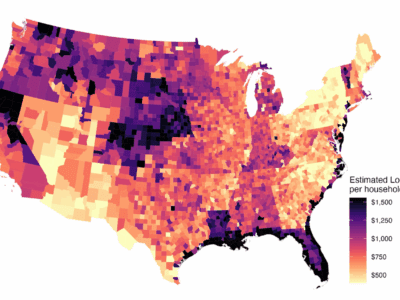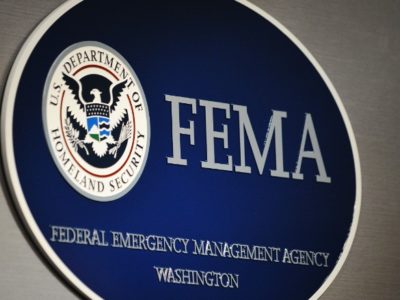In Support of Public Health Federalism
Reactionary State Responses to COVID-19 (and Other Threats to Public Health) Don’t Mean Federalism Is For Suckers
For decades, “states’ rights” has been a rallying cry of the right wing. Most Americans are familiar with the dynamics that required the federalization of civil rights law, both in the 1860s and again in the 1960s, the protection of much of our nation’s federal lands, and the national crises that necessitated the federal government to enact national minimum standards to protect public health and the environment. Many of us are also familiar with the right-wing backlash to these movements—indeed, the devolving of baseline environmental standards and public land management to the state and local level has been a keystone of the political right since at least Ronald Reagan’s presidency.
But federalism—the division of authority between state and local governments, on one hand, and the federal government on the other—doesn’t have to tilt in one (rightward) political direction. Some issues are indeed best handled at the local or state level, either for reasons that transcend left-right politics, or because that actually facilitates progressive solutions. Ceding “federalism” to the right wing ignores the ways in which it’s often completely appropriate to address major challenges in ways that differ locally. And where federalism provides a floor, rather than a ceiling, to public health protection (meaning that states have to do at least as much to protect health as federal standards dictate), it is often most effective—and also most congruent with progressive values.
This isn’t a comment on the constitutional dimensions of federalism. I agree with my colleague Jonathan Zasloff that Congress likely could constitutionally pass, under its power to regulate interstate commerce, a law “ordering a nationwide shelter-in-place order to last 90 days” under appropriate circumstances. I also agree with Jonathan, to a point, when he says
Combatting [GOP governors’] localized obtuseness is precisely why the Framers gave Congress regulatory authority. In our justified desire to resist arbitrary authoritarianism from the White House, we must remember that national crises require national solutions.
But l have to disagree with Jonathan’s argument that Trump’s (short-lived) claim that he had the authority to “reopen” businesses and institutions “did not violate federalism in the least.”
And more importantly, I must disagree with his assertion that “Federalism Is For Suckers.”
Federalism can be employed to ensure there are national solutions to national crises, while still leaving important authority to local governments—including the authority to do more than the federal government (like, for example, the federal government we have right now) would.
State and local governments possess, presumptively, broad “police power” authority to protect public health. Despite the modern connotations of the word “police,” this power forms the basis for virtually all claims of state and local authority to regulate conduct, from prevention of public nuisance to regulation of noxious land uses to just about everything local and state governments do to protect residents’ quality of life. States in most US jurisdictions have delegated much of this authority to local governments, including cities and counties. And it especially encompasses broad powers over public health, traditionally a primarily local function. The leading case in this area, from 1904, is Jacobson v. Massachusetts, in which the U.S. Supreme Court found that Massachusetts’s mandatory smallpox vaccination program was a lawful exercise of that authority. The police power is extraordinarily strong, even intruding into areas that might otherwise be considered violations of civil liberties. As Justice Harlan said in Jacobson:
[T]he liberty secured by the Constitution of the United States to every person within its jurisdiction does not import an absolute right in each person to be, at all times and in all circumstances, wholly freed from restraint. There are manifold restraints to which every person is necessarily subject for the common good. On any other basis organized society could not exist with safety to its members. Society based on the rule that each one is a law unto himself would soon be confronted with disorder and anarchy. Real liberty for all could not exist under the operation of a principle which recognizes the right of each individual person to use his own, whether in respect of his person or his property, regardless of the injury that may be done to others. This court has more than once recognized it as a fundamental principle that ‘persons and property are subjected to all kinds of restraints and burdens in order to secure the general comfort, health, and prosperity of the state; of the perfect right of the legislature to do which no question ever was, or upon acknowledged general principles ever can be, made, so far as natural persons are concerned.’
The opinion is noteworthy for its broad upholding of state and local government authority to regulate for the common good, (The opinion also opened the door to deference even to odious state policies. Unfortunately, abuses of the Jacobson principle, including the infamous, and now discredited, opinion of Justice Holmes in Buck v. Bell upholding forced sterilization of patients judged to be “feeble minded,” were common in the early 20th century. And police power to this day can be applied in ways that disproportionately impact groups lacking political representation.)
But back to federalism: Importantly, federal courts have recognized that where otherwise lawful, state and local exercises of local public health police power constitute the law of the land, unless and until Congress specifically legislates to the contrary. This principle has been recognized by the U.S. Supreme Court since at least 1886, when the Court in Morgan’s Steamship Co. v. Louisiana Board of Health said:
[Q]uarantine laws belong to that class of state legislation which, whether passed with intent to regulate commerce or not, must be admitted to have that effect, and which are valid until displaced or contravened by some legislation of congress. The matter is one in which the rules that should govern it may, in many respects, be different in different localities, and for that reason be better understood and more wisely established by the local authorities.
It’s clear that state and local governments have broad authority to address COVID-19 or other public health threats in the absence of Congressional action, and similarly that a court, or a President, lacks the ability to override that state and local authority. So federalism certainly matters, in that important sense. And this is sensible: public health—encompassing everything from sanitation to local mosquito control to most transmissible diseases—is best addressed, for the most part, at a local level.
But Jonathan is correct that Congress could, if it wanted to, use its Commerce Clause authority to provide a national solution to virtually any aspect of this national crisis. In fact, there are already existing federal authorities that explicitly coexist alongside state authority, including the power to take actions to protect public health where local authorities aren’t doing their job.
Pointedly, those authorities—including the Public Health Act and its implementing regulations—are a one-way ratchet: they allow the federal government to override some state actions that aren’t protective enough, but not to do what Trump suggests and order actions less protective of public health than what states do. For example, the PHA regulations empower the Director of the Centers for Disease Control and Prevention (CDC) to act in specified ways where “measures taken by health authorities of any State or possession (including political subdivisions thereof) are insufficient to prevent the spread of any of the communicable diseases from such State or possession to any other State or possession.” But notably, Congress has said that the law authorizing those regulations may not “be construed as superseding any provision under State law (including regulations and including provisions established by political subdivisions of States), except to the extent that such a provision conflicts with an exercise of Federal authority under this section….”
Not only does Congress certainly possess the authority to address a national crisis that spans all 50 states and far beyond, it has actually done so in the PHA—at least to the extent that it has authorized certain measures (including quarantine, “inspection, fumigation, disinfection, sanitation, pest extermination, destruction of animals or articles found to be so infected or contaminated as to be sources of dangerous infection to human beings, and other measures, as in [CDC’s] judgment may be necessary” to protect public health).
But those authorities are subject to the non-preemption clause above, and also do not authorize the President to order anything to reopen, or any action that harms public health. Congress has employed and recognized federalism here in a particular way: the federal government may act in specified ways where a local or state response has been insufficient. Otherwise, state and local law controls.
So, according to Congress, federalism does matter here.
As shown above, the Public Health Act doesn’t give the President the authority to override health-protective state policies with less-protective federal policies. So I have to conclude Public Health Act authority simply may not be used to override state and local authority to do what Trump has suggested: force the reopening of closed businesses and institutions and relax social distancing. On the other hand, the federal government may also use Public Health Act authority to take “other measures, as in [CDC’s] judgment may be necessary”; this might allow the federal government to require more such measures than states and localities already exercise. (It is unclear, though, how or to what extent those measures could be reconciled with the non-preemption clause in the law, if a state were to affirmatively legislate the reopening of its businesses or institutions. It seems unlikely Congress considered this situation when it drafted the Public Health Act.)
Local authorities have police powers for a reason. They are typically responsive to political pressure, and have local resources to deploy in response to local needs. They also enable states and counties in California to exercise public health authority, a power that would be disastrous in an administration like the current one if left to the federal government, in the flip-side scenario to Jonathan’s (federalization of less-protective policy through laws passed by Congress). Here, federalism can be used effectively and constitutionally to provide assurances of some federal backstop on the level of public health protection, and not just to erode or limit protections. Our federal environmental laws recognize this same principle, for example in enshrining the waiver of preemption for California to regulate mobile sources of air pollution and in federal non-preemption of stricter state regulation (including common law claims) of air and water pollution from factories. While a surprising number of states have even enacted legislation preventing themselves from regulating pollution more strictly than the federal government, this fact together with the actions of states like California just shows the value of a system where a federal backstop exists alongside local authorities.
Federalism isn’t for suckers. We shouldn’t be skeptical of federalism as a principle, but rather we should employ it in service of governance goals that help our country. In fact, we already do.







Reader Comments